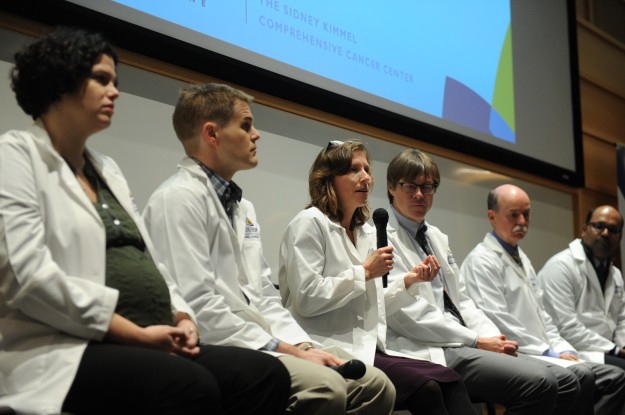On Nov. 3, 2015, a capacity crowd of more than 250 Johns Hopkins leaders, faculty, staff, students, donors, and other guests filled the Albert H. Owens Auditorium at the Johns Hopkins Kimmel Cancer Center to honor the philanthropy of Sidney Kimmel for advancing cancer discovery and care. Hundreds more watched via video streaming as Kimmel Cancer Center Director William Nelson led a thoughtful discussion of challenging topics in cancer medicine and research by a panel of cancer experts, including Kimmel Professor and Director of Radiation Oncology and Molecular Radiation Sciences Theodore DeWeese; Kimmel Scholars, GI cancer pathologist Laura Wood and cancer biology cell division scientist Andrew Holland; the Martin D. Abeloff Scholar in Cancer Prevention and Control and Deputy Chair in the Department of Epidemiology at the Johns Hopkins Bloomberg School of Public Health Elizabeth Platz; Co-Director of Cancer Immunology Charles Drake; and gene sequencing expert Vasan Yegnasubramanian.
The experts shared their views on several topics. The following are their opinions on what the future holds for cancer medicine. In two upcoming blogs, we'll share how these scientists are collaborating with others and the questions that "keep them up at night."
The Future of Cancer Medicine
Laura Wood, cancer pathologist: I hope to improve our ability to use pathology to figure out what treatment will help each patient. There will never be one cure for everyone but rather different cures for different patients. This is what we call precision medicine. We need to continue to use pathology to divide cancers into smaller and smaller subsets to help decipher who will respond best to what therapy.
Andrew Holland, cell division researcher: Cancer is disregulated cell growth. If we understand more about the molecular differences between how normal cells divide and cancer cells divide, we can develop therapies that target cancer cell division and leave normal cells untouched.
Elizabeth Platz, cancer epidemiologist: I envision ways we can intervene in cancer, beyond treatment, to prevent poor outcomes. We need to identify subsets of people who are likely to benefit more from specific strategies. As we understand the biology of cancer better, we may be able to figure out better ways of using prevention strategies for people who have cancer and those who do not. For example, smoking is linked to cancer among the general population, but it is also a risk factor for poor outcomes in patients who already have cancer.
Charles Drake, cancer immunologist: Some cancers are recognized by the immune system and immune therapy—using the immune system to fight the cancer—should be a first line therapy for these patients. Some patients have tumors that don’t readily respond to immune approaches, and for these patients we’ll need to develop combinations of radiation and conventional therapies along with immune therapies to have an impact.
Ted DeWeese, radiation oncology expert: We will expand our use of sophisticated data warehouses that have patient history, physical exam, imaging, laboratory studies, and genetic information embedded in them along with structured information on treatment outcomes and related side effects. We have built such a system in radiation oncology that analyzes any treatment plan and adjusts it to create an optimal plan that maximizes therapeutic benefits and minimizes side effects. It has already been deployed at the Kimmel Cancer Center and is now being expanded nationally, in Canada and Japan. The world of oncology changes when we have millions of patients to reflect upon to devise the best treatment for every individual patient.
Vasan Yegnasubramanian, gene sequencing expert: Many of the problems we face today can be addressed through a convergence of technologies. Sequencing and the data it provides is revolutionizing how we make treatment decisions. There is an immense depth of information we can harness, but we need to figure out how best to gather it and how best to use it.
Watch the Conversations on Cancer forum:
